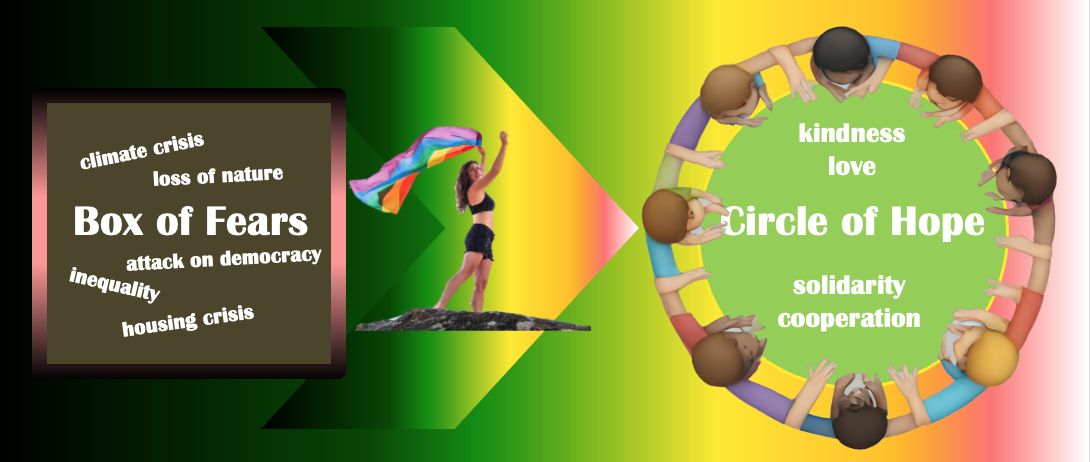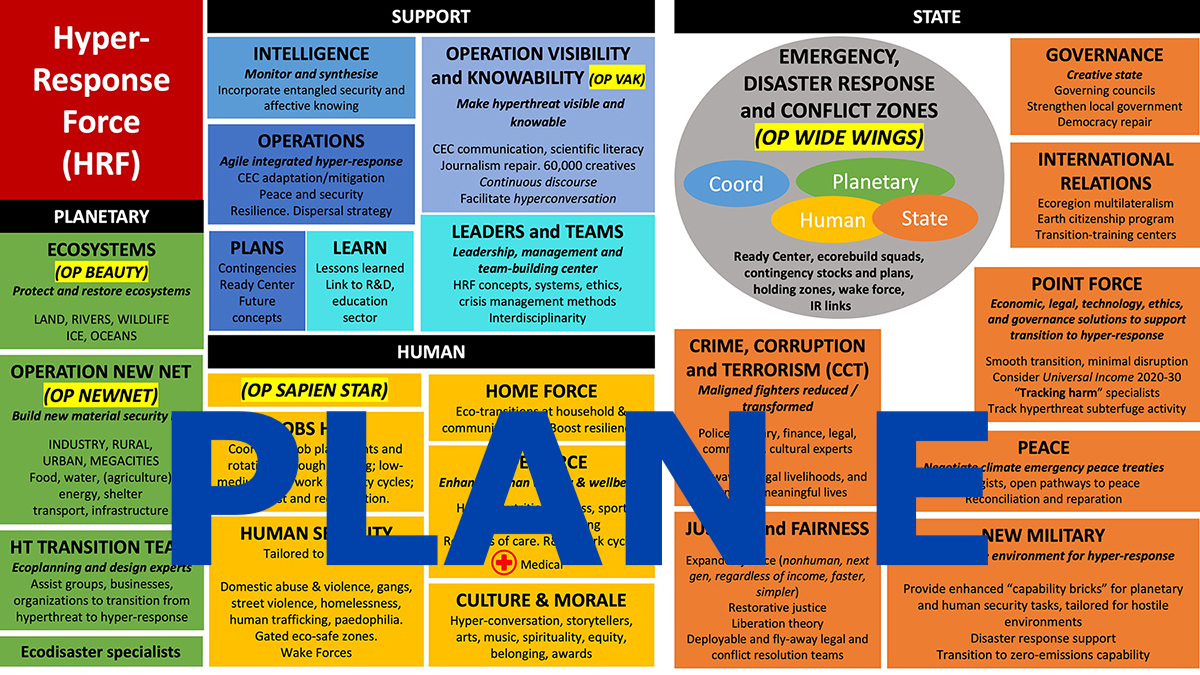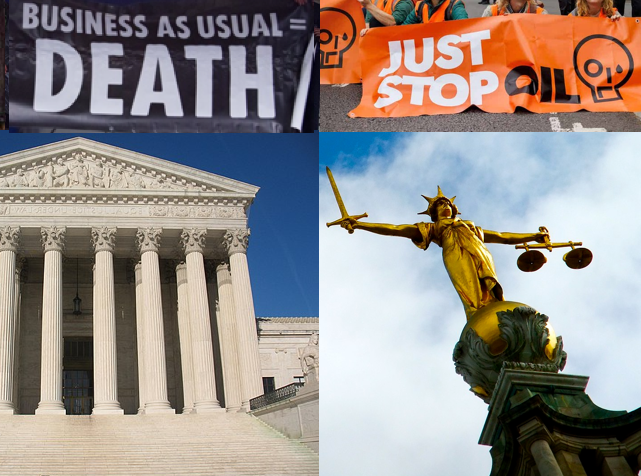Authored by Guy Dauncey
What to do? The world is falling apart around us, and while the brave few scramble to hold things together, the rest carry on doing whatever they are doing. After all, life has to go on …
The list of unfolding disasters is too much to take in. Let me put them in a box, where they may have less chance of breaking your heart.
The looming climate catastrophe
The collapse of biodiversity
The housing crisis
The explosion of billionaires alongside so many who are struggling or homeless
The cost-of-living crisis
The increase in poverty and debt in the global south
The explosion of fake news, conspiracy theories
The increasing anger and resentment
The collapse of trust in governments and democracy
The increase in people fleeing their country
The ongoing wars in Gaza, Ukraine, Sudan and elsewhere
The danger of a new financial crash
The growing loneliness
To anyone with a rational mind, one question must arise. Are these things related? Do most have a common cause? And if so – what is it?
The obvious candidate is capitalism, or specifically, the neo-liberal selfish brand of capitalism that has ruled the world since 1980, incentivizing investors to maximize their capital gains regardless of the harms they cause – the forests destroyed, the oceans plundered, the atmosphere polluted, the businesses eviscerated, the unions busted, the monopolies created, the debt-collections enforced, the evictions carried out, the taxes avoided, the social media corrupted, the politicians bribed. We campaign for divestment from fossil fuels, but when we succeed, the divested shares are bought by private equity managers who care even less about the climate crisis and the grief and suffering it’s causing.
Let me strip capitalism down to its core. Is it an economic system, which we therefore need to replace?” If it is, we might as well adopt Dante’s advice to “Abandon all hope, ye who enter here”, and join the oblivious. For did the leftist writer Mark Fisher not write that “It is easier to imagine the end of the world than the end of capitalism”?
But capitalism is not an economic system. Rather, it is a cultural system that elevates selfishness above all other values, enshrining it in the heart of business, banking, and investment. That much is seemingly true. But what if the real cause of our troubles is not capitalism as such, but simple selfishness, expressed both through capitalism, and in our personal behaviours? Apart from scale, is there any difference between the hiker who discards a plastic water bottle, the crew of a trawler who release their plastic fishing gear into the ocean, the government that allows people to dump garbage into local rivers, and the plastics factory investors who demand constantly increased production? They share three things. 1: They are selfish. 2: They are ecologically ignorant. 3: They get away with it because others have not organized to stop them.
To this line of thought, some might respond with a shrug that “You can’t change human nature.” But it’s not human nature. Persistent selfishness is culturally acquired behaviour. Our hunter-gatherer ancestors knew that it undermined their peaceful cooperative existence, so they took care to suppress it, using teasing, ostracism, and exile to dissuade people of such behaviour, and if need be, assassination.
When we contrast cultures based on selfish domination with cultures based on cooperation, history shows that we have lived through three phases. In Phase One, the dominating alpha males ran the show. In Phase Two, as hunter-gatherers, we lived cooperatively, suppressing selfishness. For the first five thousand years of our agricultural existence our ancestors continued to live cooperatively, frowning on selfishness and self-importance, just as people do in the Nordic countries, through their Code of Jante. It was only when the more successful farmers demanded the right of inheritance for their children that cooperation surrendered to selfish domination, birthing Phase Three of our existence, which has been with us ever since, with its tyrants, kings, and corporate CEOs.
The selfish dominators are not the only game in town, however. Since the 19th century people have developed cooperative banks, businesses, and housing associations. In many communities, a strong cooperative social economy is growing. Survey data from the Common Cause Foundation in Britain in 2016 tells us that 74% of us want to live by compassionate values, while 26% prefer to live by selfish values.[1] But meanwhile, the selfish dominators run the show, destroying nature, not paying taxes, and restricting our ability to live a cooperative life in which we take care of each other and our planet.
If this analysis is valid, it points to the need for action. We need a global citizens movement to mobilize people all around the world, with chapters in every community. I think of it as a ‘Circle of Hope’. We need to reframe our collective purpose as a transition to an ecological civilization in which all can flourish, nature included, replacing the selfishness of capitalism with an economy based on kindness and cooperation.
Voluntary efforts will never be enough. We need our political parties to embrace the vision, to win elections, to become the government, and to pass legislation that will among other things:
- Require every bank and business to transition to a social purpose charter within five years, or lose their license to operate.
- Protect and re-invigorate democracy, with proportional voting, votes for 16-year-olds, and frequent citizens’ assemblies.
- Create a new social contract that taxes high wealth, reduces inequality, and provides guaranteed access to affordable housing, transport, childcare, and seniors care.
- Require climate and ecological education for all civil servants, politicians, teachers, academics, judges, and business leaders.
- Tackle the climate crisis and the biodiversity crises with the urgency they need, and set a course for a full green circular economy.
- Impose a ban on all new investments in fossil fuels and other activities that destroy biodiversity or cause the climate crisis.
- Support the formation of cooperative and community banks, and empower the central bank to underwrite community-saving and planet-saving investments.
- Create a foundation for the development of community wealth, enabling the rediscovery of agency and hope in defeated and left-behind communities.
- Require the construction of millions of affordable housing cooperatives, with finance underwritten by the central bank, and builders incentivized by a ten-year tax break.
- Empower labour unions and support a voluntary transition to worker-owned businesses and cooperatives.
We will also need our governments to craft global agreements to end the selfish gain-seeking, and usher in Phase Four of our human existence: cooperative kindness. In this way, we will be able to replace that box filled with fears with hearts filled with hope.
Guy Dauncey is author of the forthcoming book The Economics of Kindness: The End of Capitalism – The Birth of a New Ecological Civilization (Palgrave/MacMillan, 2025). He lives on Vancouver Island, in Canada. www.thepracticalutopian.ca
[1] “Perceptions Matter: The Common Cause UK Values Survey.” Common Cause Foundation, London. www.commoncausefoundation.org/wp-content/uploads/2021/10/CCF_survey_perceptions_matter_full_report.pdf




